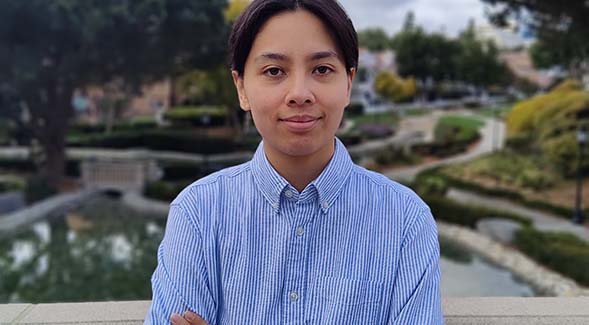LGBTQ+ Internships Lead to Employment
SDSU students in the interdisciplinary LGBTQ+ studies program have access to multiple community internships

Internships completed as part of the LGBTQ+ 598 internship course can lead to permanent positions. As two students found during the previous year, San Diego State University support helps make students career-ready for work in fields requiring expertise in diversity and LGBTQ+ issues.
Ryan Ednacot, who interned at the Lambda Archives of San Diego during the fall 2021 semester, created a zine entitled “Dismantling White Supremacy in Archives.” Ednacot accepted a position as head archivist assistant following the internship.
Dianna Ratsamy, a second-year M.A. sociology student who completed the advanced graduate certificate in LGBTQ+ studies, interned last summer at Breaking Down Barriers, an outreach and education program of Jewish Family Services of San Diego, and was offered a position as mental health outreach and education specialist.
Here Ratsamy describes the internship and job.
What were your responsibilities in your internship, and now in your permanent position?
As an intern at Breaking Down Barriers (BDB), I worked with the LGBTQ+ outreach coordinator and community partners to develop educational presentations on the mental health of LGBTQ+ people. Topics at our workshops included historical trauma, intergenerational trauma, implicit biases, self-care, community care, support systems, and how to practice cultural humility and allyship with LGBTQ+ clients.
Now, I work on call and part-time as a mental health outreach and education specialist for this same program. I now have developed experience planning educational workshops on other mental health topics such as stress management for youth.
Why was this internship important for you?
Through this internship, I learned the importance of practicing “making space and taking space” while working with community partners and the BDB team. In other words, I learned how to actively listen and learn from different BIPOC and LGBTQ+ communities I collaborated with instead of solely projecting my own biased knowledge as a graduate student coming from academia.
At the same time, I learned I already possess valuable knowledge and experiences on mental health and wellness that I can share with others as a transgender, gender-fluid, non-binary, queer, multiracial, Laotian, Mexican, and Chinese person who comes from a low-income, immigrant, and refugee family background.
How does the position align with your values?
My current position aligns with both my personal and work values of collaborative leadership, empathy, social justice, relationship-building, mental health advocacy, and accessibility. These alignments are all thanks to working with amazing, passionate, and inspirational BDB staff and community partners.
Why do you believe it’s important to make an impact in your local community?
I want to impact my local communities through working with them, instead of for them. I want to make sure the workshops and projects that I complete in my position meet the needs of the communities I work with. BDB has helped me learn how to do this through experiences I’ve had where we meet with community partners to learn more about what mental health topics their organization needs more training or knowledge in to help themselves, providers, and/or community members. This intentional approach is important in making sure people receive access to knowledge and resources that can help them create social change that works toward healing others, and themselves along the way.
How has the LGBTQ+ program helped you?
Journal entries I had to complete for the LGBT-598 internship course helped me to deeply reflect on different aspects of my internship, including my work values. I find this very impactful and useful as someone who’s still exploring my future career path after I graduate. In addition, the Queer Theory course I enrolled in last year personally impacted me in learning more about myself and other communities through reading meaningful writings from queer theorists and disability theorists that I had never been exposed to prior to taking the class.
How does this job fit in with your ultimate career goals?
My position strongly matches my future goals of working in research institutes, community organizations, and other programs that focus on the mental health and wellness of LGBTQ+, BIPOC, and other historically oppressed communities.
For more insight into the LGBTQ+ studies internship course, go to the LGBTQ+ Instagram channel.
Interview edited for length and clarity.



